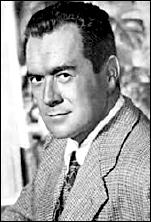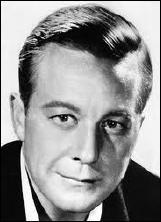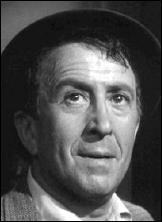Sun 22 May 2011
An Old Time Radio Review by Michael Shonk: THE AMAZING MR. MALONE.
Posted by Steve under Characters , Old Time Radio , Reviews[5] Comments
THE AMAZING MR. MALONE. Based on character created by Craig Rice. Written by Gene Wang; produced by Bernard L. Schubert.
â— ABC: January 11, 1947 through March 26, 1949. Frank Lovejoy as John J. Malone.
â— ABC: September 21, 1949 through September 24, 1950. Gene Raymond as John J. Malone.
â— NBC: May 25, 1951 through July 13, 1951. George Petrie as John J. Malone.
With the success of Craig Rice’s books and the films based on her character John J. Malone, radio wanted its turn with the popular Chicago lawyer. The ratings were good but the loss of sponsor Guild Wine forced ABC to drop its first attempt at a series, starring Frank Lovejoy. Despite two later tries, The Amazing Mr. Malone never got the sponsor it needed to survive.
Originally titled Murder & Mr. Malone, the series was an uneven attempt to blend humor, screwball plots and hardboiled mystery together. However, there were just enough moments where it worked to make The Amazing Mr. Malone one of the best comedy mystery series radio produced.
Not making the transition from the books were the characters of Jake Justus and Helene Brand Justus. Rice’s cop, Lt. Daniel Von Flanagan and his “woe is me” humor was first replaced by typical banter between Malone and Lt. McGraw, then with Lt. Sidney Brooks. Maggie, Malone’s secretary, was rarely mentioned.
Each show began with the sound of two gunshots. A frantic voice at a telephone pleading, “Operator, operator, get me John J. Malone!”
When the series was called Murder & Mr. Malone the announcer would introduce Malone as “fiction’s most famous criminal lawyer.” After the title changed to The Amazing Mr. Malone, the introduction became more sarcastic with “whose practice before every type of bar has become legend.” Malone then introduced the story, and after he became “amazing,” added the cliche of the week that illustrated the episode’s “moral” which was also its title.
The story would often begin without Malone until deep into the episode. The epilogue would usually feature Malone and Brooks at a bar discussing the case. During the Petrie series, the fourth wall would be ignored during the epilogue scene.
The following are reviews of all known (by me) surviving complete episodes of the series:

â— FRANK LOVEJOY. Recorded in Hollywood. Cast: not credited (except Lovejoy, of course).
“Charles Morgan” (May 24, 1947) In the opening of this episode from the Murder & Mr. Malone period, Malone admits he has no sense of humor and he wasn’t kidding. The serious hardboiled tone was more Black Mask than Craig Rice.
Practical joke playing gambler hires Malone to prove he didn’t kill a man who owed him money. Malone finds himself faced with a locked room mystery.
“Cleanliness is Next to Godliness” (August 28, 1948) The series is now called The Amazing Mr. Malone, and this episode reflects an effort to recreate Rice’s screwball plots. Lovejoy’s lack of comedic ability cripples any attempts of humor by Malone.
Nightclub owner murders a politician and frames his rival with the rival’s lucky rabbit’s foot.
â— GENE RAYMOND. Recorded in Hollywood. Cast: Lt. Brooks: Henry Morgan. Guest Cast not credited but included Jack Webb.

The series returns with only changes in the cast. Gene Raymond might not have been the star like Frank Lovejoy, but he could deliver lines like “When it comes to murder, I’m, just a great big blabbermouth.” Rice’s Malone was still missing. Malone refused to take one client until he was sure the client was innocent, causing Rice’s fans to wonder what the Perry Mason happened to their Malone.
“Devil Finds Work For Idle Hands” (January 29, 1950). A payroll thief (Webb) breaks out of prison to get the girl and loot he left behind. Malone finds the thief’s murdered body in his office, but when Brooks arrives the body is gone.
“Appearances Can Be Deceiving” (February 26, 1950). When a jealous husband kills the man he suspects of cheating with his wife, it sets off a chain of events that has dead bodies falling like dominoes. Webb plays the brother of the murder victim.
â— GEORGE PETRIE. Recorded in New York. Cast: Lt. Sidney Brooks: Larry Haines.
After months off the air, NBC decided to bring back The Amazing Mr. Malone as a summer replacement series starring Edgar G. Robinson (Billboard, February 10, 1951). Something happened and George Petrie was brought in to star instead.

Actually, Petrie was the closest radio got to Rice’s John J. Malone, a coward (“You wouldn’t shoot a guy just because he’s yellow?”), womanizer (he was afraid of guns because they reminded him of weddings), and a fountain of sarcasm. Larry Haines (That Hammer Guy) as Brooks showed a wonderful comedic touch and was the perfect foil for Malone, arguably even better than Rice’s Von Flanagan.
“Strong Defense is the Best Offense” (May 25, 1951). Club owner tries to stop his no good daughter from running off with a gangster. And Malone has to deal with a hitman who named his gun, Marvin.
“Seek And Ye Shall Find” (June 8, 1951). Cheating husband, disappointed when PI finds his wife is not cheating on him, refuses to pay the PI. The PI tries to shake down the wife who goes to Malone. The twists and number of characters leave you feeling like you just watched a Shell game, but Malone finally picks the right killer.
“Early To Bed, Early To Rise” (June 15, 1951). Musician decides to teach his jealous wife a lesson and fakes an affair. It was a fatal mistake.
“Hard Work Never Killed Anyone” (June 22, 1951). A man learns his first wife, thought dead, is alive and married to a rich man. His decision to blackmail her leaves him dead.
“Handsome Is As Handsome Does” (June 29, 1951). Overprotective wife of immature husband tries to save him from a murder rap. One of the weaker episodes, but the character of the femme fatale has some good moments.
“Never Judge a Book By Its Cover” (July 6, 1951). A jealous wife’s PI husband does a LAURA and falls for the woman he is hired to find after seeing her picture. Despite his efforts to protect her from the bad guys looking for her, she ends up murdered. But the killer is a stranger.
“Haste Makes Waste” (July 13, 1951). This final episode has Malone asking the audience to write in and ask for the show’s return to the air.
A complex mystery, not unusual for this series, has a crooked lawyer on the run after he cons a gangster. He had put everything he owned in his wife’s name. Now that he needs the money to get away, she dumps him and keeps the money for herself.
The lawyer hires a classical music loving hitman to kill the gangster. The gangster buys off the hitman. When the lawyer turns up dead, the hitman wants more money and when the gangster refuses, the hitman goes to Malone who represents the wife. Malone, with the help of the hitman, reveals the killer.
My source for all the Frank Lovejoy and George Petrie episodes for free: www.mysteryshows.com; or for purchase: www.originaloldradio.com. The Gene Raymond episodes are available only for purchase at: www.OTRSite.com.
SOURCES: Billboard magazine archives are available for free to view at Google ebookstore.
ADDENDUM:
THE AMAZING MR. MALONE – Australian Version. August 27, 1953 through August 28, 1954. 52 episodes. Grace Gibson Productions. Produced and Directed by Lawrence Cecil or Charles Tingwell. Cast: John Saul as John J. Malone, Harp McGuire as Lt. Brooks.
Grace Gibson Production sold many of the Australian based radio series here in America, mainly in small rural independent radio stations. The production company also purchased some American network series to be recreated by local talent for listeners in Australia. The Amazing Mr. Malone was one of those shows.
Reportedly, the recreations stuck closely to Eugene Wang’s script and the series music. The only noticeable change in content was shifting Malone from Chicago to New York. The style of the stories was more hardboiled than screwball, and the attempts at humor similar to the Gene Raymond era. John Saul’s Malone tended to oversell the humor and some of the hardboiled characters were as over the top as Mugsy in a Bugs Bunny cartoon.
Two of these recreations are still available. I found “Lucky Stiff” for free at Boxcars711 podcast at iTunes. I purchased both episodes from Original Old Radio.
“The Smoothie” (November 5, 1953). Cliche of the week and probable American episode’s title, “Nothing Ventured, Nothing Gained.”
A swindler has his hands full with an upset victim, an unwelcome return of his old partner, and his girlfriend who makes the mistake of trying to help him. He dumps her when he learns she hired John J. Malone. Malone was not all that happy about the job offer either.
“Don’t you want to work?” she asked.
“Does anyone?” replied Malone.
“Lucky Stiff” (November 12, 1953). Cliche of the week and probable American episode’s title, “Lucky In Cards, Unlucky In Love.”
A gambler and mathematical genius has become too successful for anyone to take his bets, so he hires a front. But to make his wife happy he decides to stop gambling and accepts an offer from a publisher to write a book teaching his methods of success at the gaming table. But his luck runs out when he is murdered.
There are many places on the internet to learn more about the people and world of old time Australian radio.
“Once Upon a Wireless” an oral history with Charles Tingwell.
AUSTRALIAN RADIO SERIES 1930-1970 (available as free pdf at: http://www.dadsotr.com/collectionguide_australianradioseries1930-1970.pdf
May 22nd, 2011 at 1:07 pm
There was also a TV series called THE AMAZING MR. MALONE, but no one seems to know much about it. The most extensive description I’ve discovered so far comes from
http://www.famous-detectives.com/the-amazing-mr-malone.htm
from which I excerpt:
“Originally a radio show The Amazing Mr. Malone had also a television run in the early 50s starring Lee Tracy as John Joseph Malone. Lee Tracy was a bouncy, stucky, light haired man who was possibly the screen’s fastest talker.
“Malone was a criminal lawyer in Chicago who investigated like a private detective to help his clients. There were thirteen episodes broadcasted in 1951 and 1952 on ABC.”
May 22nd, 2011 at 2:06 pm
I plan to review the TV version if I can ever find a surviving episode to watch.
May 22nd, 2011 at 2:58 pm
A little more about the TV version from the book, COMPLETE DIRECTORY TO PRIME TIME NETWORK AND CABLE TV SHOWS 1946- Present by Tim Brooks and Earle Marsh (Ballantine Books)
AMAZING MR. MALONE (Crime Drama)
FIRST TELECAST: September 24, 1951
LAST TELECAST: March 10. 1952
BROADCAST HISTORY:
Sept. 1951-March 1952 , ABC Mon 8:00-8:30
CAST:
John J. Malone: Lee Tracy
Lee Tracy, who perhaps was better known as “Martin Kane- Private EYE”, enacted the role of the “brilliant criminal lawyer” John J. Malone in this live mystery series. Malone, who had been a cynical, humorless character on radio, became a light heated sleuth with a ready quip and an affinity for pretty girls in this TV version.
It was based on the Malone novels by Craig Rice, and on the radio series which began in 1947; the TV version alternated with “Mr. District Attorney”.
Obviously Brooks and Marsh were watching TV and missed the NBC radio’s funny version of MALONE.
May 22nd, 2011 at 3:28 pm
If it was live TV ,then there is ahardly a surviving copy, I’m afraid.
May 22nd, 2011 at 4:11 pm
Nearly all network TV series during this time were done live. Many of these shows survived because someone did a kinescope copy of the shows. This was often done for the West Coast rebroadcast.
I did a review here at Mystery*File on ROCKY KING that was live show, but a few shows still exist on kinescope.
Right now I don’t hold up much hope.